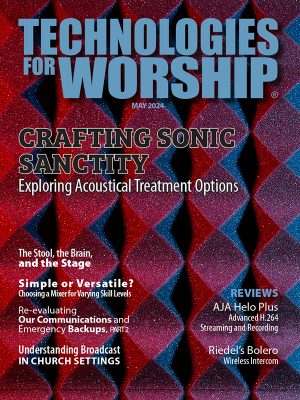
By Tim Adams
I understand, that’s a loaded question, but it’s a very important one. There is a reason the warning in Revelation 3 is in the Bible. It’s a warning against complacency and laziness, indifference, and self-centeredness.
There are many, many churches who are doing amazing and wonderful things for and in their communities to show the character and love of God and they should be commended and respected.
There are far more churches that are simply going through the motions, having church for themselves, or preaching messages that are questionable at best and downright Biblically wrong at worst.
We are living in perilous times and the term church has never been more loosely interpreted – the Bible seems to be less and less present in our services. In an effort to become or remain relevant, pastors and churches are starting to be more political and trendier; we are straying off the path into the world of production and entertainment and fluff rather than digging deeper into the Word and character of God.
I understand there are different types of churches that attract different types of believers in different stages of their spiritual walks. There are seeker churches that bring in a lot of non-believers and through Biblical messages, win over hearts and souls. These new believers often move on quickly to churches that preach on meatier topics, and this is good. However, sometimes denominational churches can fall into the pattern of preaching doctrine alone, teaching that “our church has the Truth,” as if other churches can’t possibly be teaching Biblical truth. Paul warns about this in Galatians 6:20, where he is providing a list of sinful desires that “produce these evil results: sexual immorality, impure thoughts, eagerness for lustful pleasures, idolatry, participation in demonic activities, hostility, quarreling, jealousy, outbursts of anger, selfish ambition, divisions, the feeling that everyone is wrong except those in your own little group…”
How many churches idolize something or someone in their midst? I know of one church in my area that worships their organ and music ministry. I know another who feels called to criticize the teaching of fellow churches. Yet another believes in some questionable theology about post-death activities and interactions, and there are quite a few pastors and leaders in prominent US cities that believe they are meant to be wealthy and lead opulent lives because of their “calling to ministry.”
There is nothing convenient or easy about the Christian life. When Paul talks about how Christ is the first in the line of restored humanity, that means we are meant to be restored to our original glory, the glory God created us for. That process won’t be fully realized this side of heaven, but it does indicate and suggest there is a journey to our lives and in this fallen world, journeys have ups and downs. The valleys in our individual journeys can be the darkest dark, and our peaks can be the brightest bright but it’s rare – if not impossible – for someone to never have a valley to walk through.
King David, in his famous Psalm, talks about walking through the valley of death and knowing what we do about his life and his journey, we can be assured that he knew some pretty dark valleys. But that Psalm also carries with it some pretty amazing hope in that he knows that God is with him and that should comfort us, as well. We are never truly alone and that is a very, very good thing.
In the Western world, the word convenience has become second nature; new developments seem to always be geared towards making things easier for us, more convenient. This, unfortunately, leads to complacency and laziness. Even in my own span of 43 years, I have seen a remarkable shift in behavior and attitudes towards hard work and circumstances within the church.
The rise of social media has made this much, much worse. The ability for every individual to have a platform to share their daily, and sometimes by-the-minute, lives with their network has led to an alarming rise in self-centeredness and narcissism, as evidenced by the ridiculous rise of “the Karen.” Entitlement is a disease and when we get so focused on ourselves that we resort to violence to get what we want with little to no regard for those around us, there is a real problem.
Tithes and offerings should be given from a place of joy and a desire to help the church, not from a place of control and power-grabbing.
We have seen this attitude in the church for decades, hiding under the guise of earmarked donations. Pastors and church boards, thankful for funding, inadvertently give power and authority to individuals with financial means who then utilize that authority to often usurp the leadership of the pastor and mold the church into what they want, even though they are the not the chosen and called leader for that church. Tithes and offerings should be given from a place of joy and a desire to help the church, not from a place of control and power-grabbing. Pastors and church boards need to stand firm in their authority and ensure large donations come with no strings attached and if that is not a possibility, to deny those donations, regardless of how badly they are needed. This practice is yielding of power and authority is faithless and exposes the truth of a leader’s faith, or lack thereof, in God.
Paul talks extensively about how we, as the church and believers, are to support those called to lead us. Support means financial, emotional, spiritual, and psychological. What I see and hear about far too often are churches made up of members who absolutely demolish pastors, beating them up emotionally to the point that I know of one pastor who seriously contemplated suicide! That should NEVER happen and that behavior needs to be addressed by the overseeing authority, immediately and with finality.
Our time on this sphere is coming to a close, I think we can all agree. Perhaps not in our lifetimes, but we are certainly closer to Christ’s return that we are away from it and Revelation carries a stern warning for those who are lukewarm in their spiritual walks. This is not a call to more duty and adherence to the proper doctrine, but rather a call for ensuring we are dedicating time and space to furthering our own, personal journeys with God.
God is after our restoration, healing and ultimately, freedom; why else would Christ reference Isaiah 61:1 when announcing his public ministry? Those were not idle words, but rather the desire of God’s heart towards His people throughout all recorded history, from the moment humanity fell to the moment we are all called up to journey with Him to the place He has prepared for us. However, that doesn’t mean we can’t experience that restoration and healing and deliverance this side of heaven. God wants to heal us, make us whole and holy and is waiting for us to but turn to Him, open the door to our heart, and walk with Him into those dark rooms we have locked up and hidden away behind a facade of “I’m ok,” for far too long.
It will hurt, it will suck, but it’s so worth it to experience the release, the relief, and the joy on the other side…and to help others experience the same is arguably the most rewarding feelings of my life and I invite all of you to do the same. Don’t know where to start? Email me directly and I would be happy to have that conversation with you. In fact, I’m thinking about starting a weekly video meeting for church techs and one for pastors to provide a place to walk through the wounds of our lives together so we can all heal together. Drop me a line if you’re interested in walking that journey together: info@timatosystems.com

Tim Adams spent over 20 years volunteering in church technical ministry and now focuses on helping small churches achieve technical excellence through equipment upgrades, training, sharing best practices and teaching leadership how to cast God-sized vision.




